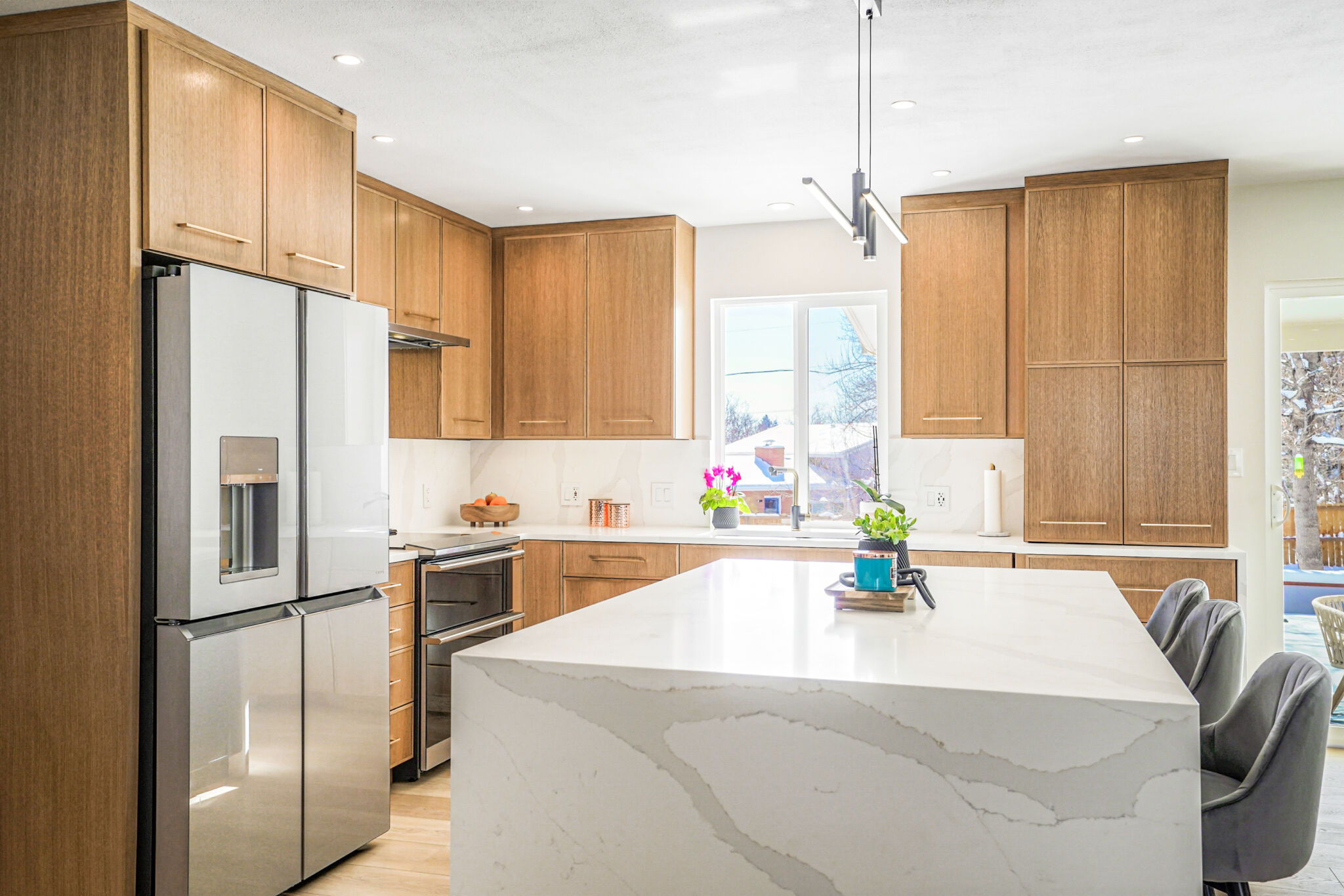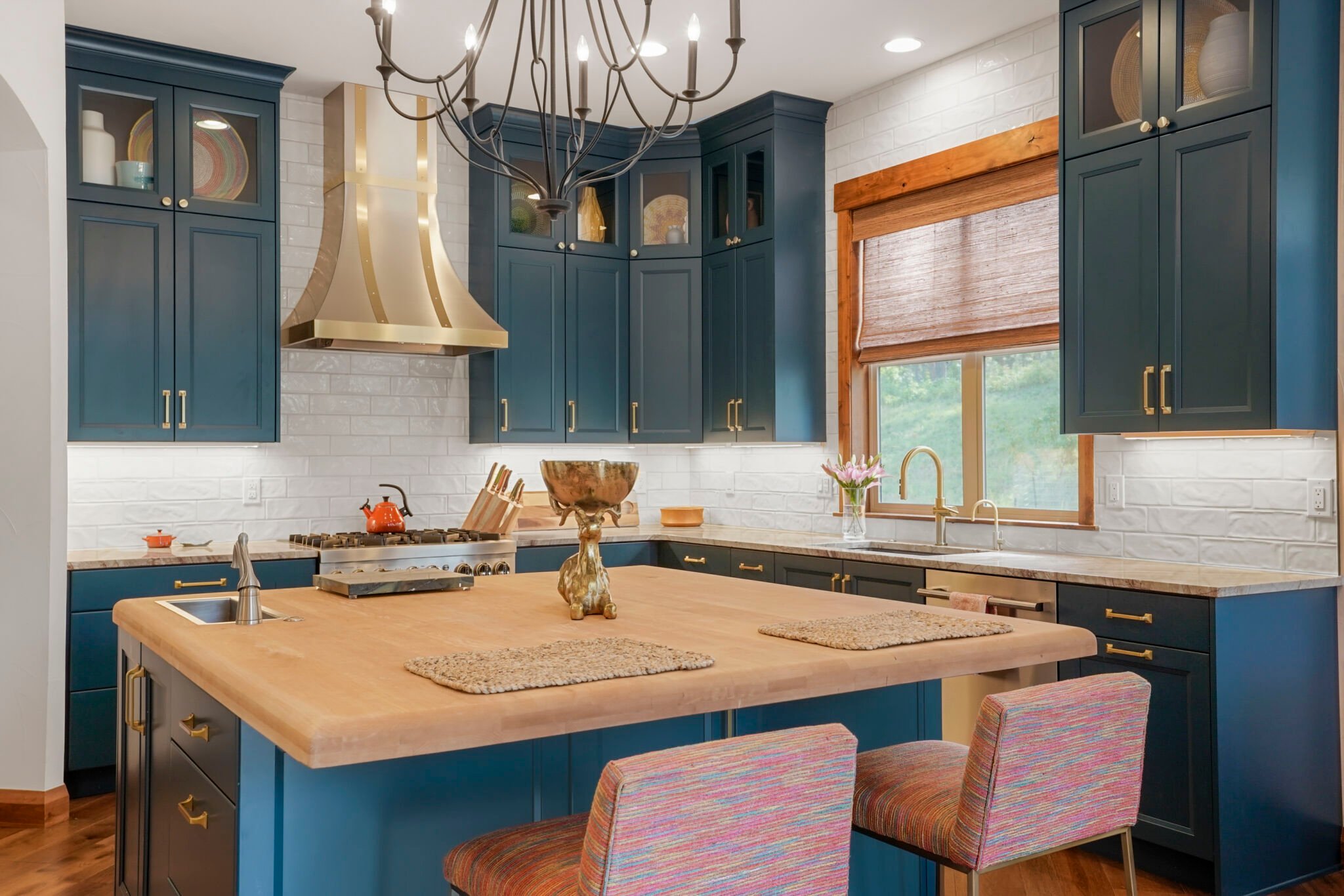28 Feb A Guide to Kitchen Countertops
Granite continues to be the most popular choice for kitchen countertops. However, heading into 2014, some homeowners are choosing alternate countertop materials in their Denver kitchen remodel.
Here is a list of countertop surfaces that offer unique characteristics, colors and textures, sure to complement any kitchen configuration.
Marble
If you want the look of luxury that recalls European palaces, marble is the selection to make. Its elegance is less expensive than granite and can add value to your home. However, it is also more porous and softer, which means it’s more likely to show dings and scratches. Sealing it can protect the surface, but you must be careful to promptly clean spills, such as from lemon juice, red wine or other acidic liquids, to avoid permanent blemishes.
Stainless Steel
This metal surface lends an industrial look to any kitchen. It is hypoallergenic, doesn’t retain smells or bacteria, and is easy to clean, making it a popular choice in both commercial and residential kitchens. Along perimeter cabinetry, stainless steel countertops are usually installed as one piece with a backsplash, eliminating any grout lines that can trap food and dirt. Although it’s a durable surface, it does have the potential to show scratches, dents and fingerprints, so use a cleaner that is designated for stainless steel.
Engineered Quartz
Engineered quartz is a composite material of crushed stone bound together by a polymer resin, which makes it super hard and low maintenance. The palette of colors is also vast. Because it’s as durable as concrete, it is less likely to crack or chip. It’s also non-porous, which means liquids and other sources of stains do not affect it. However, engineered quarts does not resist heat as well, so utilizing hot pads and trivets on your countertops is a necessity.

Photo | BKC Kitchen and Bath
Soapstone
Like granite, soapstone is a natural, quarried stone. It’s composed mostly of mineral talc, which makes it quite soft. However, soapstone used for countertops typically has a higher percentage of quartz in it, which makes it harder and more suitable as a kitchen surface. Although not as heat resistant or impervious to dents and scratches as granite, regular oiling and buffing helps keep the surface looking smooth. Many homeowners appreciate how the color tends to darken with age, adding to the overall aesthetic.
Butcher Block
A warm alternative to cool stone is the character-rich butcher block, which can be made from nearly any wood. Walnut lends a rich, dark color that is very striking. Maple also works well, because it’s a hard wood with a nice, clear grain. But options aren’t restricted to common woods. Butcher block can also be crafted from bamboo and sustainably-farmed exotic woods like wenge and zebrawood. At minimum, a wood kitchen countertop requires oiling every six months to keep it protected. Depending on the level of use, it may also require more frequent oiling and conditioning to prevent the wood from cracking and looking dull. Avoid using cooking oil to treat butcher block, because it can damage the wood. Note that because butcher block is soft, it mars more easily than other materials, so it’s best not to use knives on it. Keep a cutting board on hand for that.

Photo | BKC Kitchen and Bath
Recycled Paper-based
Paper composite countertops are made of post-consumer recycled paper and other fibers held together by a formaldehyde-free thermoset plastic resin. What starts out as pulp is turned into paper and transformed into a dense, durable, attractive material that can be tooled like wood and used for nearly any surface or design accent, from sink basins to desktops. These eco-friendly countertops are heat-resistant to 350 °F and withstand most stains and scratches, but be careful not use abrasive cleaners; administer a sealant-like mineral oil to minimize the appearance of blemishes. Paper composite countertops have a warm touch, come in a variety of colors, and are unquestionably durable, with functionality that will last for years.
Recycled Glass and Cement
Recycled glass kitchen countertops, such as IceStone, are made from three core ingredients: 100% recycled glass, cement and pigment. On their own, glass and cement are stout materials. When combined, they become a durable duo with a life expectancy of 50 years or more. Plus, more than 75 percent of the content is from post-consumer recycled content, which keeps waste out of landfills. Some manufacturers offer style flexibility, allowing you to choose the pigments and glass for a custom counter uniquely tailored to coordinate with your cabinetry. Although the material resists both heat and scratches, the cement portion is porous. Therefore, it has the potential to take on stains. Keep the surface dry and immediately wipe up spills, especially of coffee, wine, soda, juice, and oil or vinegar based products.
Copper
Copper countertops are a good mid-price alternative to slab stone. They are surprisingly easy to clean and maintain and have the benefit of minimal joints, because the backsplash and the nosing are integral to the copper’s profile. Since it’s a “living” surface, it reacts to different substances. This creates a blend of matte reds, browns and greens. An occasional light application of olive oil helps keep the copper relatively stain-free. However, nothing can prevent acids from etching and discoloring its surface, which is part of its beauty and charm.
Tile
While many homeowners reserve tile for floors and backsplashes, tile countertops can be an excellent – and affordable – option. Ceramic tile is durable, impervious to heat and water, and when properly glazed, won’t stain. Maintenance can be difficult with all of the grout, but choosing a durable and dark grout can make things easier. Also, administering a proper sealant will help ensure that the grout won’t discolor or stain. With so many colors and patterns to choose from, tile as a countertop surface is an extremely versatile option.
Contact us to learn more about kitchen countertop materials and how to use them in your Denver kitchen remodel.



